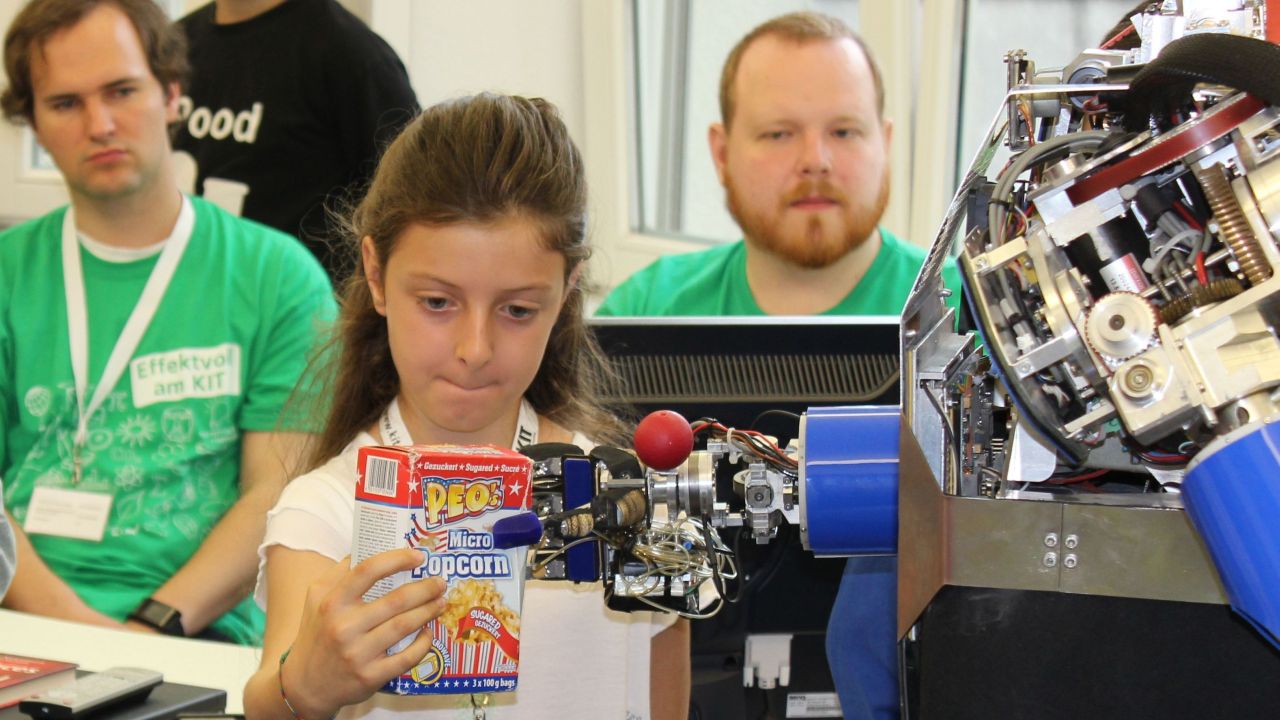
Artificial intelligence, AI for short, is subject of imagination, films, and stories, but it also is reality. Superhuman capacity of AI is obvious in games as well as in image and language processing, in autonomous driving, in digital language assistants, and chatbots. In research, humanoid, or human-like, robots fascinate people, as they give abstract methods of AI a physical appearance that can be experienced. The real-world lab "Robotic Artificial Intelligence" at Karlsruhe Institute of Technology (KIT) is aimed at making AI tangible in a variety of experiments and different real environments, including childcare centers, schools, museums, libraries, and hospitals. The lab will be funded by the Baden-Württemberg Ministry of Science, Research, and the Arts with EUR 800,000.
"Real-world labs foster close cooperation between science and society and their close interaction in addressing a problem. This is of particular importance in the key area of artificial intelligence. I am very happy that the parties involved in KIT's real-world lab "Robotic Artificial Intelligence" are dedicated to making AI tangible by humans through humanoid robots and jointly analyzing both opportunities as well as potential risks," says State Science Minister Theresia Bauer.
"AI and robotics for industry, the care sector, and education will change our everyday life. At KIT, we are working on optimally using the opportunities of this development for our society," says Professor Holger Hanselka, President of KIT. During the current Corona crisis, for example, this might relieve the staff in the social sector that is facing tremendous challenges. "At the same time, we want to address potential risks of AI and AI robots," Hanselka continues.
"Participatory, dialog- and user-oriented research is of central importance to us at KIT and helps identify needs and socially beneficial applications of the technology," emphasizes Professor Oliver Kraft, KIT's Vice-President for Research. "For this reason, we think that not only scientific interdisciplinary collaboration, but also exchange and interaction with society are essential."
"Exchange of knowledge and experience at a real-world lab takes place in both directions: Research and application meet on equal footing for subsequent development of those technologies humans need and would like to have," says Professor Tamim Asfour from KIT's Institute for Anthropomatics and Robotics and coordinator of the lab. The goal is to develop concrete practical applications of robotic AI together with civil society and to study opportunities as well as risks, he adds. "It is all about making the potentials of robotic AI tangible for our society and demystifying them."
Robots Helping in Education and the Social Sector
At the real-world lab, humans will experience AI embodied by humanoid robots in several scenarios. At a new building of the municipal hospital, the next generation of the KIT-developed humanoid ARMAR robots will support the hospital staff by guiding patients from the reception area to the hospital wards, for instance. At the Children's Universe, the daycare center of KIT, robots will support children in learning foreign languages. At the municipal library, they will read to children. At the Goethe-Gymnasium and other schools in Karlsruhe, children will learn in a playful way the basic concepts of computer science and AI. At KIT, students from all over the world can use robots to conduct remote experiments with them. At ZKM - the Karlsruhe Center for Art and Media, humanoid robots will interact with the visitors.
Depending on the development of the Corona pandemic, the first robots will start operation in the course of the next year.
More about the KIT Information · Systems · Technologies Center: http://www.kcist.kit.edu
Being "The Research University in the Helmholtz Association", KIT creates and imparts knowledge for the society and the environment. It is the objective to make significant contributions to the global challenges in the fields of energy, mobility, and information. For this, about 9,300 employees cooperate in a broad range of disciplines in natural sciences, engineering sciences, economics, and the humanities and social sciences. KIT prepares its 24,400 students for responsible tasks in society, industry, and science by offering research-based study programs. Innovation efforts at KIT build a bridge between important scientific findings and their application for the benefit of society, economic prosperity, and the preservation of our natural basis of life. KIT is one of the German universities of excellence.






